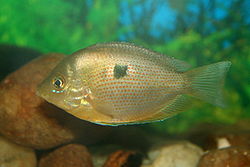
Orange chromide
Encyclopedia
The Orange chromide is a species of fish
endemic to freshwater
and brackish
streams, lagoon
s and estuaries in southern India
and Sri Lanka
. The species is popular with fishkeeping
hobbyists, and is kept frequently in aquarium
s. The species is part of family
Cichlidae and is included in subfamily Etroplinae
.
 The species co-occurs throughout its range with the green chromide
The species co-occurs throughout its range with the green chromide
(Etroplus suratensis). Orange chromides prey on the eggs and larvae of E. suratensis and also act as a "cleaner fish
" removing parasites from the larger green chromides. The species also feeds on zooplankton
and algae
.
Fish
Fish are a paraphyletic group of organisms that consist of all gill-bearing aquatic vertebrate animals that lack limbs with digits. Included in this definition are the living hagfish, lampreys, and cartilaginous and bony fish, as well as various extinct related groups...
endemic to freshwater
Freshwater
Fresh water is naturally occurring water on the Earth's surface in ice sheets, ice caps, glaciers, bogs, ponds, lakes, rivers and streams, and underground as groundwater in aquifers and underground streams. Fresh water is generally characterized by having low concentrations of dissolved salts and...
and brackish
Brackish water
Brackish water is water that has more salinity than fresh water, but not as much as seawater. It may result from mixing of seawater with fresh water, as in estuaries, or it may occur in brackish fossil aquifers. The word comes from the Middle Dutch root "brak," meaning "salty"...
streams, lagoon
Lagoon
A lagoon is a body of shallow sea water or brackish water separated from the sea by some form of barrier. The EU's habitat directive defines lagoons as "expanses of shallow coastal salt water, of varying salinity or water volume, wholly or partially separated from the sea by sand banks or shingle,...
s and estuaries in southern India
India
India , officially the Republic of India , is a country in South Asia. It is the seventh-largest country by geographical area, the second-most populous country with over 1.2 billion people, and the most populous democracy in the world...
and Sri Lanka
Sri Lanka
Sri Lanka, officially the Democratic Socialist Republic of Sri Lanka is a country off the southern coast of the Indian subcontinent. Known until 1972 as Ceylon , Sri Lanka is an island surrounded by the Indian Ocean, the Gulf of Mannar and the Palk Strait, and lies in the vicinity of India and the...
. The species is popular with fishkeeping
Fishkeeping
Fishkeeping is a popular hobby concerned with keeping fish in a home aquarium or garden pond. There is also a fishkeeping industry, as a branch of agriculture.-Types of fishkeeping systems:...
hobbyists, and is kept frequently in aquarium
Aquarium
An aquarium is a vivarium consisting of at least one transparent side in which water-dwelling plants or animals are kept. Fishkeepers use aquaria to keep fish, invertebrates, amphibians, marine mammals, turtles, and aquatic plants...
s. The species is part of family
Family (biology)
In biological classification, family is* a taxonomic rank. Other well-known ranks are life, domain, kingdom, phylum, class, order, genus, and species, with family fitting between order and genus. As for the other well-known ranks, there is the option of an immediately lower rank, indicated by the...
Cichlidae and is included in subfamily Etroplinae
Etroplinae
Etroplinae is a subfamily in the cichlid family of fishes. The subfamily includes two genera: Etroplus, which are the only cichlids native to India and Sri Lanka, and Paretroplus from Madagascar .-References: : Molecular phylogeny and biogeography of the Malagasy and South Asian...
.
Diet

Green chromide
The green chromide is a species of cichlid fish from freshwater and brackish water in southern India and Sri Lanka...
(Etroplus suratensis). Orange chromides prey on the eggs and larvae of E. suratensis and also act as a "cleaner fish
Cleaner fish
Cleaner fish are fish that provide a service to other fish species by removing dead skin and ectoparasites. This is an example of mutualism, an ecological interaction that benefits both parties involved. A wide variety of fishes have been observed to display cleaning behaviors including wrasses,...
" removing parasites from the larger green chromides. The species also feeds on zooplankton
Zooplankton
Zooplankton are heterotrophic plankton. Plankton are organisms drifting in oceans, seas, and bodies of fresh water. The word "zooplankton" is derived from the Greek zoon , meaning "animal", and , meaning "wanderer" or "drifter"...
and algae
Algae
Algae are a large and diverse group of simple, typically autotrophic organisms, ranging from unicellular to multicellular forms, such as the giant kelps that grow to 65 meters in length. They are photosynthetic like plants, and "simple" because their tissues are not organized into the many...
.

